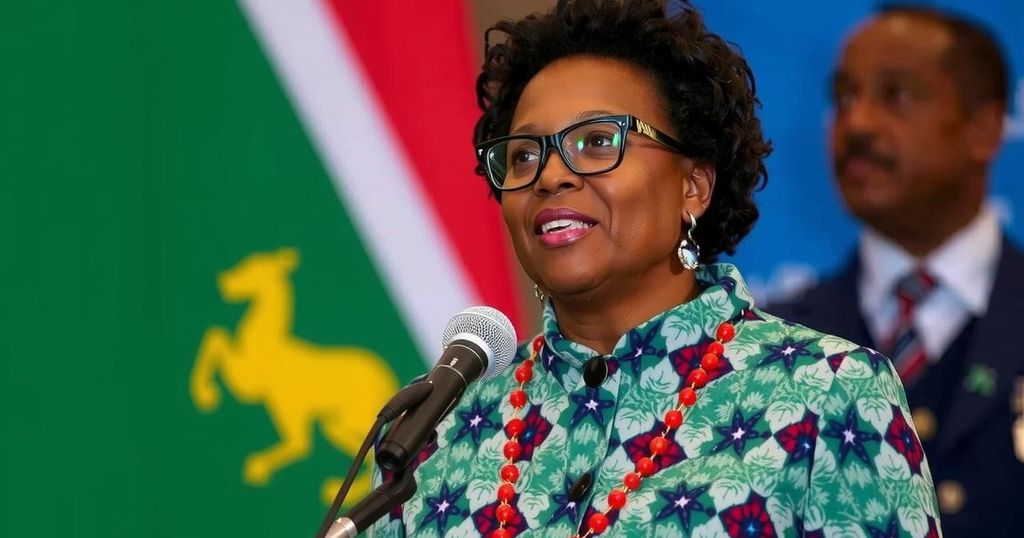World news
2024 ELECTIONS, AFRICA, AFRICAN NATIONAL CONGRESS, BRITAIN, DEMOCRACY, ELECTIONS, ELECTORAL PROCESS, GOVERNANCE, GOVERNMENT, INDEPENDENT PATRIOTS FOR CHANGE, IPC, ITULA, NANDI - NDAITWAH, NET, NEW INDEPENDENT PATRIOTS FOR CHANGE, NEWCASTLE, SOUTH AFRICA, SOUTHERN AFRICA, SWAPO
Amira Khan
0 Comments
Namibia Elects Netumbo Nandi-Ndaitwah as First Female President Amid Controversy
Namibia has elected Netumbo Nandi-Ndaitwah as its first female president, winning 57% of the vote in disputed elections marked by technical problems. Nandi-Ndaitwah’s victory maintains the ruling Swapo party’s long-standing power, while opposition parties plan to contest the results due to irregularities in the election process. This election reflects ongoing political tensions in Namibia and trends in the southern African region regarding voter dissatisfaction.
Namibia has made history by electing its first female president, Netumbo Nandi-Ndaitwah, amid contested elections primarily due to technical issues. Having served as the vice president, Nandi-Ndaitwah garnered 57% of the vote, surpassing expectations that a runoff would be needed. This victory solidifies the ruling Swapo party’s dominance, marking 34 years since Namibia gained independence from apartheid South Africa in 1990. Following the announcement, Nandi-Ndaitwah stated, “The Namibian nation has voted for peace and stability.”
Nandi-Ndaitwah, a prominent figure in Namibia’s fight for independence during the 1970s, has previously held the position of foreign minister. Her ascension to presidency comes following the death of President Hage Geingob. However, opposition parties have raised concerns over the fairness of the election, citing various issues, including a lack of ballot papers that necessitated an extension of the voting period, which they regard as illegitimate, and they plan to challenge the election results legally.
Panduleni Itula, a former dentist who returned to Namibia in 2013, secured 25.5% of the vote, a decline from his previous performance. Nandi-Ndaitwah’s performance exceeded that of her party in parliamentary votes, where Swapo fell to 53% from 65% five years prior. Furthermore, her leadership defies regional trends where incumbent liberation movements have faced backlash from younger voters. In contrast, other parties in the region have witnessed losses, reflecting a growing discontent among electorates.
The recent elections in Namibia represent a significant political milestone, as they not only mark the first time a woman has been elected president, but they also highlight ongoing tensions within the political landscape. The ruling Swapo party has maintained power since Namibia’s independence in 1990, but there is a growing sentiment among the populace, especially younger voters, who are increasingly critical of long-standing political leadership. The circumstances surrounding the election, particularly the claims of malfeasance and mechanical failures, raise questions about electoral integrity and democracy in the region. In comparison, nations like South Africa and Botswana have recently seen notable shifts in political power due to voter dissatisfaction with ruling parties.
In summary, Namibia has elected its first female president, Netumbo Nandi-Ndaitwah, amidst a disputed electoral process. While her win represents a historical advancement for gender representation in leadership, the allegations of electoral fraud and the opposition’s claims merit closer examination to ensure fair democratic practices. Nandi-Ndaitwah’s presidency may offer a stabilizing force for the nation, but the concerns raised by opposition parties indicate a need for greater transparency in future elections. Her leadership will be pivotal in addressing these challenges while promoting peace and stability in Namibia.
Original Source: www.theguardian.com




Post Comment